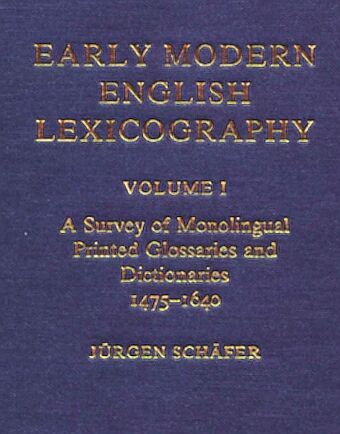|
The following is a
quotation from "Old Dictionaries, New
Knowledge" by Richard W. Bailey (Second-day
keynote speech of Conference on Early
Dictionary Databases/Toronto, October
1993);
available
http://www.chass.utoronto.ca/epc/chwp/bailey/.
Just how valuable these
early dictionaries are for the study of
English was demonstrated on a much larger
scale by the late Jürgen Schäfer.
(Professor Schäfer's last appearance
on the academic scene was in Toronto; just
after his return to his family in Augsburg,
he died in 1985 at the premature age of
52.) Schäfer studied the precursors of
the "hard word" dictionaries of the early
seventeenth century, the glossaries often
appended to sixteenth-century translations
from both the classical and modern
languages. These glossarists, he declared,
"were not merely indiscriminate copiers but
true pioneers in the field of
lexicography".[4]
Schäfer's work -- brought to
publication by his widow, Loretta
Schäfer, and some of his former
colleagues and students -- illustrates just
how valuable these old word lists can be.
Like all the rest of us, Schäfer stood
on the shoulders of his precursors: those
who formed and catalogued the great
research libraries; others in our century
who compiled the great bibliographies -- in
this instance, the Short-Title
Catalog by Pollard and Redgrave; still
others who filmed or facsimiled scarce
books to make them widely available.
Schäfer and his co-workers scanned
more than a thousand titles in the search
for glossaries; devised an encoding scheme
using fixed data fields on punched cards
(fortunately for us, a now obsolete
technology); and published the results.
More than 6,000 quotations, as a result,
supplement, amplify, and improve the
coverage of English words found in the
OED.
Why, one might ask, was the study of these
old word lists worth the trouble? If all
the additions were on the order of
bumdockdousse, the effort could not
easily be justified.
One use of Schäfer's work is to
re-write the history of English
lexicography. His study of these glossaries
shows that the seventeenth-century
dictionary-makers were more attentive to
actual usage than had previously been
thought. They did not mainly anglicize
Latin or French words to swell the size of
their books but gathered evidence of
borrowed words already used in English.
Schäfer's attention to minute detail
also illuminates the history of the
Oxford English Dictionary, a matter
previously treated in his Documentation
in the OED. Studying what might have
been found -- but wasn't -- could be seen
as an indictment of the Dictionary;
in fact, the rather meagre harvest of all
these labours only increases one's
admiration for Murray and his successors,
particularly when we now know that the
collecting was often haphazard and whole
sections of the alphabet gathered before
Murray became editor were simply lost.
But the history of lexicography is a
narrow field. If the study of these word
lists contributed only to that, it would
hardly be worth the effort. Yet much larger
questions are invited by Schäfer's
work. For one thing, he shows that
Shakespeare's lexical originality has been
exaggerated. Many words are given in the
OED as Shakespearean coinages but
they are not. This exaggeration of his
importance is partly the result of the
attention given to him as the great
national poet of England. Some of these
"Shakespearean" words -- attractive
in Hamlet, for instance -- were, as
Schäfer discovered, already in use by
others -- as one might expect from a
popular playwright aiming at pleasing,
rather than puzzling, the audience. From my
own viewpoint, as a historian of English, I
find the "inkhorn" controversy much
illuminated by Schäfer's collection.
"Inkhorn" terms were the undigested
borrowings from other languages --
particularly Greek and Latin -- thought not
to match the "genius" of English but taken
straight from the classical ink pot. In the
sixteenth century, this battle of ancient
and modern worked itself out over such
words as the "Saxon" scypman vs. the
"Latin" mariner.[5] Schäfer
gives us a useful insight into this dispute
by showing how touch-line competed
with tangent or wisdom-teeth
with teeth of sapience. Even more
significant, from my viewpoint, are his
discoveries about borrowed words from the
Americas. In the English Renaissance,
anglophone patriots were already beginning
to see the "treasure of our tongue"
enriched by borrowings from distant
languages. In fact, most of the American
exotica -- like coca or
sassafras -- came from no more
distant a spot than Spain.
Some of Jürgen
Schäfer's publications in this field:
| Schäfer,
Jürgen. |
Documentation in the
O.E.D.: Shakespeare and Nashe as test
cases. Oxford: Clarendon P,
1980. |
| —. |
Early Modern English
Lexicography. 2 vols. Oxford:
Clarendon Press, 1989. |
| —. |
"The Hard Word Dictionaries: A
Re-Assessment." Leeds Studies in
English 4 (1990).
31-48. |
| —. |
"Introduction." Ductor in
Linguas (Guide into the Tongues) and
Vocabularium Hispanicolatinum (A Most
Copious Spanish Dictionary) (1617).
Delmar, New York: Scholars' Facsimiles
& Reprints, 1978.
v-xxi. |
| —. |
"John Minsheu: Scholar or
Charlatan?" Renaissance Quarterly
26 (1973). 23-35. |
|
